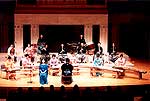- ORA-J (Orchestra Asia - Japan Ensemble)
- Reference: Pro Musica Nipponia
The formal name of this ensemble is the Orchestra Asia - Japan
Ensemble (ORA-J).
ORA-J is the Japanese instruments section of the Orchestra Asia
which is described in another page. The independent activities
of ORA-J started on September 3, 1998 when its first regular concert
was held at Casals Hall. As of 2001,ORA-J keep 30 more instrumentalists
as regular member, and performs four regular concerts per year.
Also the ensemble performs many other concerts in each prefecture
in Japan, workshops at various schools, and planning concerts
on abroad.
In 1963, when “Kurudando” was being performed, Minoru Miki decided
to organize new ensemble involving all of the traditional Japanese
instruments. As a result the Pro Musica Nipponia (Nihon Ongaku
Shudan) was started in 1964 by 14 musicians. From that time, until
1984 Miki, as Artistic Director, devoted his efforts to creating
many repertories and establishing an international reputation
for PMN. He brought forward many kinds of concerts in Japan, and
also produced more than 130 concerts abroad. He won the Grand
Prize of the governmental Art Festival in 1970 with PMN’s four
record set. In 1981, his “Symphony for Two Worlds” commissioned
by the Gewandhaus Orchestra in their bicentennial celebration
had its world premiere, and after twenty more performances around
the world, the piece made its American debut with the New York
Philharmonic and PMN under conductor Kurt Masur in 1994.
Since the founding of PMN, Miki has helped to organize several
amateur ensembles in this genre. However, he began to feel anxious
when no other professional ensemble appeared extend over more
than 30 years. When ORA was founded in 1993, members from PMN
gave their assistance but after several concert tours, some solo
players wanted to move to ORA-J. In addition to the transfer,
ORA-J sets auditions and is getting aspiring players as its own
fresh registrants. Then ORA-J started as desirable rival with
PMN.
ORA-J uses almost the same repertories as PMN, but soon their
execution for each piece will showed different color. After the
first regular concert, ORA-J performed the “Symphony for Two Worlds”
with the Tokyo Metropolitan Symphony Orchestra on 25th January
1999 at the Suntory Hall. In 2000, Miki composed Trio Concerto
“The Music Tale of Genji” after his 7th opera “The Tale of Genji”,
and premiered in September at Tsuda Hall successfully. In this
case Yang Jing (Pipa) played with Reiko Kimura (Koto) and Seizan
Sakata (Shakuhachi) as “Asian Soloists”.
Miki’s main works for this genre are showed below (selected pieces
which use more than 6 players):
Kurudando (1963) + mixed chorus
Paraphrase after Ancient Japanese Music (1966) + soprano vocalize
Figures for four group (1967~9)
Ballades for Winging (1968) + tenor solo, mixed chorus
Convexity (1970)
Tanu Tanu Ballade (1971) + bariton solo, children chorus
ÅgFour seasons” Dances Concertantes I (1973)
Matsu-no-Kyoku (1974) + female chorus
Wa (1976)
Wasan Concerto (1976) + orchestra
Hote (1976)
Taro (1977) + 5 singers, children chorus
ÅgNaruto Hicho” Dances Concertantes II (1977)
Matsu Yo (1979) ;+ mixed chorus
ÅgA Tale of Hachiro” Dances Concertantes III (1980) + song, narration
(option)
Little Suite (1980)
Concerto Requiem = Koto Concerto No.3 (1981)
Symphony for Two Worlds (1981) + orchestra (full size)
Choral opera “Toge no mukau ni Nani ga Aruka” (1982) + 6 singers,
mixed chorus
Rainbow Overture (1983) + Chinese traditional instrumental orchestra
Matsu no Kyousoukyoku = Koto Concerto No 4 (1984)
ÅgKita no Uta” Dances Concertantes IV (1984)
SOUL (1989) + Korean traditional instrumental orchestra
Ki no Kane (1992) + soprano solo, female chorus
LOTUS POEM = Shakuhachi Concerto(1994)
Requiem 99 (1998) + marimba solo [NB] another version of Concerto
Requiem
Trio Concerto “The Music Tale of Genji”(2000) +pipa, shakuhachi,
koto
About scores and recordings of above works, please refer to the
office of:
Pro Musica Nipponia
TEL +81-3-3378-4741, FAX +81-3-3376-2033-
President of ORA-J is Seizan Sakata http://www5.big.or.jp/~seiwa/
Vice President is Hiromitsu Nishikawa and Harue Hanabusa
Chief Producor is Yoshihiro Nara
Artistic Director is Minoru Miki (holding as same roll as ORA)
ORA-J will have own office with training room soon. Until this
occasion please contact us through Miki’s e-mail address. |


